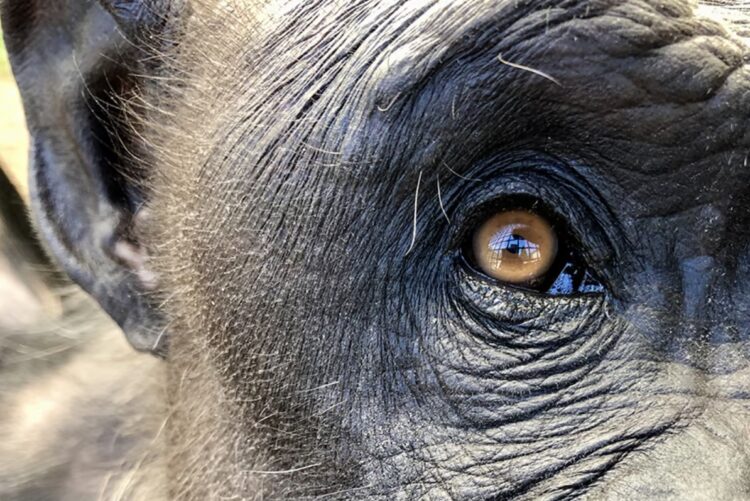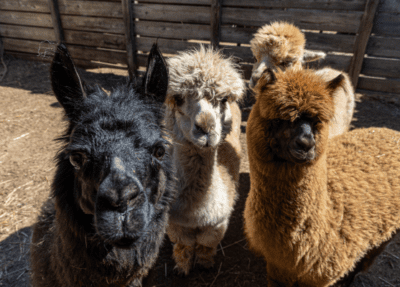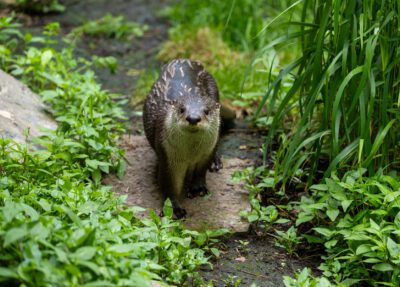Did you see the debut episode of Chimp Crazy last night on HBO? Over the next four weeks, the new show from the producers of Tiger King distributed by Warner Bros. Discovery will be airing new episodes both on HBO and Max. And based on the content so far, it’s clear that thoughtfulness is recommended when watching, because primates’ lives are at stake—and the series so far showcases some human behaviors and attitudes we do not condone.
The documentary also brings to mind some of the research Lincoln Park Zoo has done on depictions of chimpanzees, which led zoo scientists to create ChimpCARE. This project, which is unpredecented for a zoo, focuses on improving life for all chimps in the U.S. The zoo also partners with Chimp Haven, a sanctuary in Louisiana. Years of research, led by the late Dr. Steve Ross, shows that images of chimpanzees in human environments are detrimental to their conservation—and zoo researchers continue to study the topic and publish research to find out more about what we should and shouldn’t do to help primates in human care.
The four-part docuseries focuses on Tonia Haddix, who calls herself the “Dolly Parton of chimps.” The description of the show says it “exposes the risks humans take when they try to raise these animals as members of their family, as well as the risks to the welfare of the animals themselves”—and it comes at an opportune time.
That’s because right now, a number of organizations—including Lincoln Park Zoo—are championing the Captive Primate Safety Act. The CPSA was recently reintroduced as a bill in Congress and focuses on banning private ownership of nonhuman primates—including apes (like gorillas and chimps), monkeys (capuchins and macaques), and prosimians (lemurs and lorises).
But why should you care? And why do we? Lincoln Park Zoo has long been involved in work to get primates out of the hands of those unqualified to care for them, so they can live lives full of choice and free of unnatural behaviors that have been proven to shorten their life spans and degrade their quality of life. The fact is, private owners cannot give chimps what they need, and here’s why.
Disease Risk
Primates are our closest relatives in the animal world, with chimpanzees sharing 99% of our genetic material. We are often susceptible to the same infection risks as they are and can transfer diseases back and forth through casual contact, air-borne pathogens, and exposure to bodily fluids. Humans are known to be susceptible to dozens of the bacteria, helminths, viruses, and ectoparasites that primates carry. And primates can get diseases from people as well that impact their health and longevity. Human cold sores, for example, can kill smaller monkeys like tamarins.
Infection risks include viruses such as monkeypox, herpes B (which may be passed by macaque bites and scratches), simian T-cell lymphotropic virus, simian foamy virus, Ebola, and influenza. They also include bacteria, like Salmonella, Campylobacter, Shegella, Yersinia, and the ones that cause tuberculosis. Parasitic infections can transfer hosts, so humans may also be in danger of catching retroviruses.
Numerous cases exist in which transmission has been documented and people have died from their exposure to these pathogens. Wild-caught primates are especially dangerous to the health of exotic pet owners. And as they are often kept in unsanitary, crowded conditions while being trafficked, primates being transported for the pet trade may be even more likely to catch diseases. There are even diseases that have been observed just in trafficked or captive primates.
At institutions such as accredited zoos, the risks are mitigated with personal protective equipment, like face masks, and when something happens it is treated appropriately and immediately. In homes, private owners don’t always find it comfortable or convenient to take preventative measures. And when those owners are affected by illness, they may delay getting medical treatment that can help them.
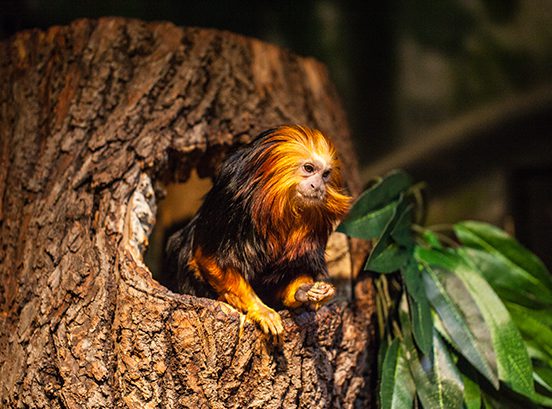
Dangerous to People and Homes
While some animals, like dogs, have become domesticated and even co-evolved alongside humans, non-human primates are still wild animals. That’s why many organizations and individuals in different areas of expertise, from the American Bar Association to the Association of Zoos and Aquariums, work to alert people to the dangers of keeping primates as pets.
Chimpanzees, for example, can get up to 220 pounds and live for more than 60 years—and they show quite a bit of aggression even in their native or proper social environments.
In addition, primates can be territorial and unpredictable, just like people. Between 1990 and 2013, The Humane Society of the United States (a zoo partner in the fight to pass the CPSA) reported 275 human injuries from non-human primates in personal possession in 43 states. Once sexual maturity is reached, owners can expect increased levels of destructiveness from primates—even the tiny and cute capuchins, which are only 12 pounds on average but can definitely wreak havoc with household items like kitchen tools, personal electronics, and more.
News stories about privately kept monkeys attacking humans abound. In the Ukraine in 2022, an escaped monkey attacked a two-year-old girl, who was hospitalized with severe injuries. In Oklahoma last year, a Dickson woman received injuries from a pet capuchin that jumped on her, pulled her hair, and ripped her ear. A family member then shot and killed the monkey (the owner was apparently out of town at the time). In Russia just a few months ago, a monkey described as “scorned” and “drunk” by media bit five people and was so strong that it took three men to restrain him. And those are just the latest in a long string of incidents.
It should be noted that some violent incidents may have been triggered by a misreading of primate expressions. People are notoriously bad at reading their emotions, and a 2017 study with Barbary macaques notes that facial expressions that differ in meaning between humans and nonhuman primates “can lead to an increased risk of aggression and injuries for both humans and animals.”

10/24/13 11:20:46 AM Lincoln Park Zoo
© Todd Rosenberg Photography 2013
Implications for Individual Animal Welfare
The negative effects of keeping nonhuman primates as pets has been well-documented. The primates’ health outcomes, behavior, and welfare are all impacted by living in domestic home situations, often as the only primate in the house. To start with, most nonhuman primates live in complex social groups and need contact with others of their kind for good mental and emotional health. Social isolation causes major issues for these animals as they get older in every category from communication to sexual behavior. Some, taken away from their social groups before 1 year of age, have even been known to hurt themselves and show aggression to others. Social deprivation has been shown to affect their physical health, too.
Sadly, there’s more. Primates have evolved to eat a diet based on conditions in the wild, which is harder to reproduce in private homes—a human diet won’t work for them long-term. In addition, young primates are often taken from their mothers prematurely to be sold as pets—sometimes hours or days after birth. This causes stress, behavior problems, and other issues. Primates need different temperature, light, noise, and humidity levels than humans, too, and the lack of these can cause physical problems, including the loss of digits and metabolic bone disease. Pet primates often develop Type 2 diabetes due to their inappropriate diet and lifestyle.
Most private owners do not have access to the specialized veterinary care that primates need, both on a preventative basis and in terms of emergency care. And people do not tend to get any kind of veterinary care for pets that they believe may be illegally obtained.
When people can’t handle these primates, they may try to modify their natural behavior in unethical and increasingly desperate ways, from confinement and corporal punishment to surgery, such as removing teeth and nails. The lucky ones end up at accredited zoos and sanctuaries—but their lack of socialization can make it hard for them to integrate into troops. While they are in a better place than before, the surrendered primates then require special, individualized care plus a major outlay of resources so they can live out their lives peacefully and naturally.
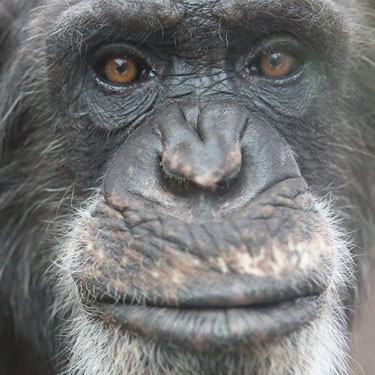
Conservation Implications: Wildlife Trafficking
The main threats to nonhuman primates around the world include habitat destruction, being hunted for food, and the illegal wildlife trade. Currently, it is estimated that global trade in nonhuman primates involves tens or even hundreds of thousands of individuals a year, equaling multiple billions of dollars. Wildlife trafficking continues to grow, threatening the conservation of many species and reversing gains that many people have worked very hard to accomplish. Make no mistake: the trade of primates both alive and dead is unsustainable at best—and at its worst it not only reduces the survival of global wildlife, but also destabilizes economies as well as international security.
In 2014, an International Fund for Animal Welfare investigation found 33,006 endangered wildlife parts and products for species listed in CITES I and CITES II, which includes all primates. A 2023 study found that the number of primate parts imported mainly from African countries to the EU, a major wildlife trade hub, between 2002-2021 numbered 22,000. And the amount of primate meat imported to the EU, mostly from Asia, equaled 600 tons (that’s 1.32 million pounds). That’s not even counting the animals taken live for the pet trade. The numbers are big and scary, and show what a major problem the wildlife trade poses.
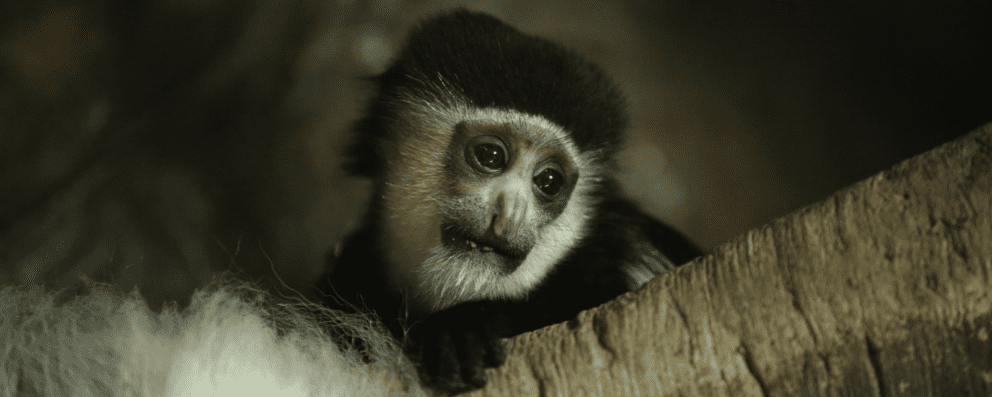
How the Captive Primate Safety Act Helps
The bipartisan 2024 Captive Primate Safety Act, introduced in May by U.S. Representatives Brian Fitzpatrick of Pennsylvania and Earl Blumenauer of Oregon, plus Senator Richard Blumenthal of Connecticut in May, prohibits interstate commerce and private ownership of primates.
Specifically, it amends the Lacey Act of 1981, making it illegal for private individuals to import, export, sell, receive, acquire, or purchase through interstate or foreign commerce any prohibited primate species. It also forbids people from breeding or possessing such species, while allowing private owners who already have a nonhuman primate to retain them. However, all primates as pets must be registered with the U.S. Fish & Wildlife Service.
Take Action With Us
We at Lincoln Park Zoo—and our many partners in this effort, from the Monitor Conservation Research Society and the North American Primate Sanctuary Alliance to 80 members of the Association of Zoos and Aquariums—believe that now is the time to act. If you’re interested in helping pass the Captive Primate Safety Act, go to lpzoo.org/takeaction and use your voice! Simply fill out the form on the web page and we’ll provide updates on the fight, along with tools to contact your representatives and spread the word. Primates need our help!
